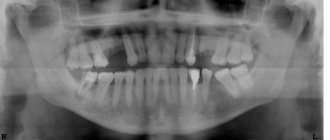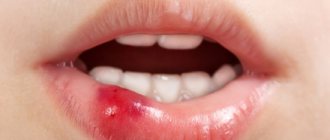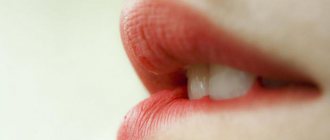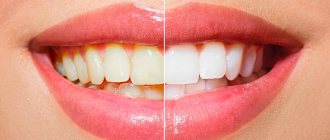- What does a swollen lip look like?
- Reasons for a swollen lip
- What measures to take when your lip is swollen? If your lip is swollen due to a bruise
- If your lip is swollen due to an infectious disease
- If the lip is swollen due to inflammatory processes
- If your lip is swollen due to herpes
- If the lip is swollen due to purulent processes in the oral cavity
- If your lip is swollen due to allergies
- If your lip is swollen due to external factors
- If your lip is swollen due to piercing, tattooing, or plastic surgery
- If your child's lip is swollen
Plump and sensitive lips are the dream of every girl and the external advantage of a young man. Such an external preference can prompt a person to use special cosmetics or even push for surgical intervention, but sometimes this feature develops contrary to our wishes. We are talking about sudden swelling of the lip, when the question naturally arises - what to do when the lip is swollen ?
| An excessively swollen lip is primarily an external defect that you want to get rid of. Moreover, only in rare cases does it occur for no reason; usually it occurs from certain health problems, which are no less important to eliminate. |
Under no circumstances is it possible
- Warm the swollen surface with all sorts of lotions; such actions will only make the swelling even worse. The same recommendation applies to warming ointments.
- Use decorative cosmetics to mask the damage, since these products contain many substances that can cause even greater harm to the damaged surface.
- Eat a meal, especially hot and cold dishes, as well as various solid foods.
- It goes without saying that you should forget about alcohol and smoking during the entire recovery period of the damaged area.
- You should not constantly touch a swollen lip. Firstly, it increases skin irritation, and secondly, it creates favorable conditions for the penetration of pathogenic microorganisms. If there is bleeding, then you can’t stop it with anything, use only sterile materials for this.
It is also advisable to protect the swollen area from direct sunlight and any mechanical influences, including kisses.
To treat edema, use traditional medical and folk remedies. But remember one thing - if you can’t eliminate the swelling on your own, then you need to contact a specialist at a medical facility. This will protect you from the serious consequences of such an event, seemingly insignificant at first glance.
Surgical intervention
Lip wounds with radiating edges require sutures. A local anesthetic is injected into the wound site and the edges are then sutured. The suture is treated with an antiseptic, and then a sterile bandage is applied.
Stitching a wound on the lip
The suture site is checked daily for inflammation. If the healing process is successful, the sutures are removed on the 10th day. Large complex wounds and multiple stitches may require additional assistance from a plastic surgeon.
After suturing, the patient is prescribed medications such as:
After the sutures are removed, the wound is treated with an antiseptic without a sterile dressing. To prevent the development of inflammation in the mouth, rinsing with herbal decoctions, furatsilin and treatment with hydrogen peroxide are recommended.
Stitching outside a medical facility is prohibited. Even with experience, there is a high probability of infection, since it is impossible to achieve infertility at home, which is possible in the operating room.
What to do first
Apply ice or something cold. The effect of low temperature on the surface of the swelling leads to its reduction and relieves pain. But this recommendation only applies if the fabric itself is in good condition. If there is an open wound with bleeding, then only qualified medical care is needed, which involves anesthesia and suturing.
When using ice for a compress, it should be wrapped in gauze or thin cloth. It is not advisable to use it in its pure form, so as not to cause frostbite.
Relief does not come immediately; long-term use of the method is necessary. The compress is kept for 10-15 minutes every 3 hours. The effect occurs within several days of the procedure.
What does a swollen lip look like?
No matter how obvious the answer to this question may seem, lip swelling varies depending on the origin of the defect. Both lips can swell evenly; only one lip can be swollen - either the upper or the lower. The tumor itself can be concentrated evenly, in the center, asymmetrically on one side of the lip, only in the corner of the lips.
The only defect may be swelling and swelling of the lip; they can also develop against the background of suppuration, ulceration, and damage to the oral mucosa. A swollen lip is usually accompanied by hyperemia, that is, redness of the surface, pain or discomfort.
In addition, a swollen lip may be characterized by dryness and elasticity of the mucous membrane.
Pharmacy products to eliminate lip swelling
The most famous and reliable remedy is Badyaga gel. It can be used throughout the day in unlimited quantities. To do this, just apply it to the damaged surface and rub until completely dry. In case of severe acute pain in the damaged area, simply apply a layer of gel to the swelling and wait for it to be absorbed. It helps the regeneration process, relieves swelling, relieves discomfort and protects the skin from drying out and tightening.
Rescuer ointment is also a fairly popular remedy. The principle of operation is the same as that of Badyagi, but the Rescuer is also an antiseptic. In addition, this ointment moisturizes the skin, improves its appearance and relieves pain.
Hydrogen peroxide is also used to disinfect the damaged area. It also relieves swelling and kills pathogens. It is applied to a cotton pad, which is applied to the swollen lip. This action must be performed every two hours. This method is especially effective when lip swelling is associated not with mechanical damage, but with infectious diseases. Its only disadvantage is that hydrogen peroxide dries the skin, which leads to microcracks.
Some people use lead water to make lotions from it. It also relieves swelling well and eliminates pain. It must be cooled before use.
In addition to the listed remedies, doctors recommend using ointments: heparin, troxevasin, lyoton, ketonal and nurofen-gel. These drugs are familiar to absolutely every person and are sold in pharmacies without a prescription.
Important. If you notice purulent discharge or scar formation at the site of injury, you should immediately consult a doctor. The same thing should be done if the hematoma caused by the blow does not resolve for a long time and fluid begins to accumulate at its location. Surgery is required to eliminate these symptoms Otherwise, this can lead to, at a minimum, dysfunction of the oral cavity, and at maximum, pose a threat to life.
Lip laceration: first aid
Pre-processing is carried out in the following sequence:
- Stop bleeding - cold is applied to the lip, followed by hemostatic agents to reduce bleeding. It is recommended to treat the wound with hydrogen peroxide to prevent inflammation.
- Reassure the person and record the time of the wound formation - if there is a large loss of blood, hemorrhagic and painful shock can occur, so talk to the victim and maintain communication with him before coming to the hospital.
- Reducing pain in the wound - the patient can be given any painkiller (Analgin, Nurofen), which will reduce pain symptoms and improve the general condition.
How to properly freeze a wound on the lip
In the absence of breathing and a threadlike pulse, it is necessary to carry out a series of resuscitation measures aimed at maintaining vital processes in the body. Artificial respiration is performed through the nose, as the wound site may become infected. Indirect cardiac massage allows you to avoid clinical death, but if performed incorrectly, complications can arise.
If the patient is unconscious, place him on his side so that if the wound bleeds, blood does not enter the stomach through the mouth. Severe painful shock can cause vomiting, so lying on your side minimizes the likelihood of vomit entering the respiratory system.
Traditional methods of treating lip swelling
The first remedy is cabbage leaf. It is applied to the injured area 2 times a day.
A mixture of honey and aloe helps eliminate swelling and has bactericidal properties. Aloe leaves are crushed, added to honey and mixed until smooth. Those who are allergic to honey can only use aloe vera.
A mixture of castor oil, honey and wormwood is also effective. Wormwood is also finely crushed and added to honey along with castor oil. Stir until smooth and apply to the swollen lip for 15 minutes twice a day.
As a compress, you can use a decoction of wild rosemary flowers. To do this, take 1 teaspoon of the plant and pour a glass of boiling water, keep it on low heat for 15 minutes, then cool it to room temperature and make lotions twice a day. Before use, the decoction must be filtered.
You can make lotions from potato starch. To do this, it is mixed with water until a paste-like mass is formed and applied to the swelling 2 times a day.
A popular compress is tea bags used to brew tea. They are cooled to room temperature and kept on the injured area for 5 minutes.
Another available method is to use baking soda. It is diluted in water until a creamy consistency is formed and lotions are applied for 20 minutes once a day. However, this method is not recommended for use in the presence of open lip injuries.
The fastest way to eliminate swelling is a celandine compress. Its use allows you to get rid of an unpleasant symptom in just a few times. But, this method requires extreme caution, since the plant is poisonous to the human body and, if used incorrectly, can cause serious burns to the skin.
What measures to take when your lip is swollen?
The most correct advice is to consult a specialist. No matter how superficial and insignificant such a problem as a suddenly swollen lip may seem, its origin can be very dangerous to health - this is the spread of infection in the body and frequent relapses, suppuration and ulceration of the damaged area, the attachment and spread of infectious flora, which only aggravates the course of the pathology .
If your lip is swollen due to a bruise
The most obvious and completely removable cause of lip swelling. It usually happens in a short time after injury and may be accompanied by damage to the integrity of the skin and mucous membranes. If timely treatment of the defect is not undertaken, it can be aggravated by inflammation, infectious damage, and suppuration.
Compresses must be applied to the injury site. Warm or hot. You can start with any choice, and if the first is ineffective, give preference to the second. A cold compress slows down blood flow to the injured area. For this, it is enough to wrap a few ice cubes in a cloth and apply it not so much to the lip and tumor itself, but to the skin nearby. A piece of cloth soaked in hot water can be an alternative, and again, not on the lip, but on the skin next to it, for 15-20 minutes.
If a wound has formed on the lip after a bruise, it is recommended to treat it with hydrogen peroxide and an agent that stops bleeding and promotes healing. It is recommended to use the antiseptics Miramistin or Chlorhexidine, healing ointments Actovegin and Solcoseryl. A “homemade” alternative to pharmaceuticals can be lanolin, olive or sea buckthorn oil.
However, please note that the skin on the lips is very thin and delicate, and deep wounds are difficult to heal. If the lip is so broken that the contour of the lips is lost, their shape changes significantly, rush to the doctor, otherwise healing may occur soon (at best), but the lips will lose their attractive appearance.
If your lip is swollen due to an infectious disease
The lip may become swollen due to a viral or bacterial infection. Moreover, the infection can be localized either directly in the oral cavity or on the lip (stomatitis, herpes), or throughout the body (ARVI).
In this case, antiseptic drugs will demonstrate effectiveness, the use of which is not recommended to delay. They quickly stop the infection and prevent it from spreading and getting worse. When purchasing a drug, it is important to familiarize yourself with the indications for its use and contraindications, which may result in side effects.
Popular antiseptics for the treatment of infectious diseases of the oral cavity are drugs such as Orasept, Chlorophyllipt, Bioparox. They have bactericidal, antiseptic, and analgesic effects. It is sprays and liquids that are easier to use on a swollen lip, rather than tablet or gel-like medications. It is advisable to moisten a cotton pad in the medicine and apply it to the damaged area of the lip.
If the lip is swollen due to inflammatory processes
The inflammatory process in a swollen lip is usually accompanied by the formation of a certain substance inside - it can be a clear liquid, pus, or any other discharge that is concentrated inside or released outside. This is usually accompanied by bad breath, pain, and often visible damage to the mucosa.
This poses a greater health hazard than it may seem. Since unprofessional removal of secretions is fraught with infection, and measures aimed at resolving the tumor do not always eliminate the true cause of inflammation, and subsequently it can appear again either in the area of the lips or in another area of the face.
It is important to establish the cause of the inflammatory process. Typically it is any of the following:
- swipe,
- cut or rupture of soft tissues,
- presence of an open wound,
- squeezing pimples.
In the first hours of the development of inflammation, it is necessary to respond with measures available to any average person - this is treating the damaged area with hydrogen peroxide. Another quick response measure could be treating the swelling with iodine solution (it is recommended to dilute it 1:1 with plain water). If you are already experiencing excessive dryness of the mucous membrane (and iodine dries out the treated area), it is enough to drink ordinary still water in small portions, the saturation of which will also moisturize the mucous membrane.
If you feel that you are not getting better, the pain and swelling are not decreasing, you should urgently contact a medical facility. Failure to contact a specialist in a timely manner can lead to the accumulation of pus in the lip, which requires surgical removal.
If your lip is swollen due to herpes
When your lip is swollen, you can suspect herpes only if it is a disease characteristic of the body. The formation of herpetic blisters on the lips is usually caused by swelling and soreness of the lips. Within 24 hours, such a swelling forms into a characteristic blister containing a translucent liquid inside.
Under no circumstances should you press or burst the resulting bubble, and the use of specific agents is most effective when starting at the tumor stage, which allows you to speed up the healing process. Popular antiherpetic drugs include Zovirax, Herpevir, Acyclovir. In their formula they contain components that exclusively destroy the manifestations of the herpes virus and have an analgesic and healing effect. They need to be applied regularly and systematically, not only until the main symptoms subside, but also until the blisters completely disappear and for another 1-2 days after that.
If the drugs of this group are powerless and within a few days the symptoms do not subside, but also worsen, the cause is probably not herpes, and therefore it is necessary to seek help from a specialist and not delay treatment that is adequate to the specific case.
If the lip is swollen due to purulent processes in the oral cavity
A swollen lip can be a symptom of stomatitis, gingivitis, periostitis (commonly called gumboil). This type of origin of swelling is perhaps the most dangerous, since purulent processes are certainly accompanied by inflammation, hyperthermia, deterioration in general health and is fraught with the spread of not only the infection, but also the pus containing it deep into the body.
Infectious and inflammatory diseases of the oral mucosa, jaw, periosteum can be caused by any traumatic lesion of the mucous membrane, improper treatment of dental diseases (including wearing braces, dentures, etc.), insufficient antiseptic treatment of the oral cavity during them or poor hygiene in general. Hypothermia, weakened immune system and stress are of secondary importance. If the reason for the appearance of a tumor lies precisely in diseases of the oral cavity, this does not mean that the danger is local in nature, inflammation can either occur from within the body or spread further, for example, through the bloodstream, which means that swelling on the lip can be eliminated without professional help, and the cause that caused it is unlikely to succeed. It is wise to consult your dentist for specific recommendations.
If your lip is swollen due to allergies
To come to this conclusion, it is necessary to analyze the list of recently consumed food products, cosmetics, household chemicals; perhaps the flowering season begins or an allergy develops to dust or animal dander.
It is typical that the lip is unlikely to become swollen due to inhalation of an allergen (which reduces the likelihood of dust and fur being involved in the swelling); the local action of the allergen is more likely, which means the use of cosmetics and food products, when the lips are easily exposed.
If the lip is truly swollen due to an allergic reaction, then the swelling will also be accompanied by slight numbness, redness, dryness and flaking of the lips.
If your lip is swollen due to external factors
These usually include frostbite or, conversely, overheating and chapping. Damage of this kind is characterized by excessive dryness of the lips, redness and peeling of their surface and, naturally, in the recent past the victim should recall the presence of a certain negative impact. Such an effect does not entail any particular danger, however, it would be useful to treat the lips with a moisturizing cream or cosmetic balm, or special restorative lip masks, which can be prepared at home.
If your lip is swollen due to piercing, tattooing, or plastic surgery
Performing piercings, tattoos in the lip area, or changing their shape through plastic surgery exposes a person to an increased risk of developing swelling and other unpleasant symptoms in the lip area. Swelling can develop either immediately after manipulation or after some time.
It is recommended to carefully examine the punctures or tattoos; it is better to entrust this to a cosmetologist or the person who did them. Thus, the likelihood of developing an inflammatory or purulent process in this area is excluded or confirmed. When piercing, it is very important to check the inside of the piercing and be sure that there are no foreign bodies in it. The jewelry itself can also fit into an extended puncture and cause discomfort and pain to the lip.
Persons with piercings, tattoos, or lip surgery still have the possibility of being exposed to the main risks listed above of the formation of a swelling on the lip.
If your child's lip is swollen
This situation is complicated primarily by the fact that the baby cannot always explain his feelings, describe the events of the last days that could lead to a tumor, especially when it comes to an infant.
During breastfeeding, babies may experience pain on the lips, and parents may notice swelling here due to improper feeding. Incorrect latching of the baby to the breast can cause the formation of calluses in the mouth, and therefore the baby’s discomfort during feeding should be a reason to reconsider the tactics.
It is necessary to take into account that children develop stomatitis more often than adults, and therefore the oral cavity must be examined and, having taken the first measures to treat stomatitis, still contact a pediatric dentist.
Children are more susceptible to allergic reactions than adults, their body is more sensitive to external irritants, children are more susceptible to respiratory viral and bacterial infectious attacks, and therefore, excluding self-medication, it is necessary to contact a specialist for specialized help.
Another reason for a swollen lip in a baby is a simple bruise. It must be dealt with in the same way as in an adult, with the exception of the use of certain pharmaceutical drugs that are not recommended for children.
Causes of injury
In everyday life, lip dissection occurs most often due to negligence or accident. You can trip, fall and hit your face, or find yourself in the path of a stone thrown by someone. Traumatologists note that some of the injuries people receive are the result of curious and incredible coincidences. There was a recorded case where a man went to the emergency room after being attacked by a chicken.
The consequences of a fight, beating or robbery do not belong to domestic injuries, but belong to the sphere of offenses. A split lip may be accompanied by associated injuries that complicate the healing process. Any complicating factor is a strong argument in favor of refusing self-medication and contacting a traumatology department.
Drug therapy. What drugs are used?
If you have a broken lip and you trust traditional medicine, then the following tips are for you. So what to do in such cases? To relieve swelling, you can use the following medications:
- Bodyaga. It is better to buy it in gel form and rub it in an unlimited number of times throughout the day.
- Ointment "Rescuer". It will improve the overall condition of the lip and also disinfect it.
- Various ointments (Ketonal, Nurofen-gel, Troxevasin and other similar medications).
- Lotions with lead water. The product must be refrigerated before use. Lead water has an analgesic effect. In addition, the product quickly solves the problem of swelling.
First aid and proper damage assessment
A large number of small blood vessels, close proximity to the mucous membrane, a complex muscular structure that provides rich facial expressions - all these factors directly influence the immediate aggravating symptoms that accompany even a slight cut of the lip.
Severe and rapidly worsening swelling and heavy bleeding make it difficult to quickly assess the severity of the injury. Therefore, it is recommended to follow a simple algorithm: if possible, stop the bleeding and wash the wound, apply cold.
Important: an ice compress can be applied for no more than fifteen minutes, after which you must take a break of equal duration.
The main parameters of dissection are the length of the relative red border of the lips and the width of the resulting wound. If the tear extends beyond the red border of the lips, then serious damage to the muscle fibers can be suspected, and a width of more than 7 mm is a clear indication for surgical help.
Lip bruise: symptoms
The main symptoms of a bruised lip are pain, bruising and swelling, and bruising may also appear. Symptoms appear quickly, literally against the background of changes in the lips.
There is a thickening on the inside of the lip at the site of the injury. Its size depends on the force of the blow, the amount of blood spilled, the victim’s blood pressure, the degree of coagulation and elasticity of the tissues.
Additional signs of injury include:
- it hurts to open your mouth;
- the appearance of watery blisters, ulcers and pustules at the site of injury;
- coating of lips with cracks;
- deterioration of general health, apathy, drowsiness;
- chills and increased body temperature up to 38 degrees;
- Itchy eyes and runny nose.
Severe inflammation and compaction can cause severe pain, increased swelling and an increase in temperature up to 40 degrees.
First aid for cutting
Falling off a swing and hitting your lip and nose is a common occurrence. Soft tissues are easy to break, bite, and as a result they can swell and swell. The main condition when receiving an injury is to remain calm. As soon as the liquid has stopped oozing, you should begin treating the wound.
First aid when a child breaks his lip is to rinse the wound with warm water and treat it with an antiseptic. It is important to wash your face with soap to remove dirt and blood; dirty hands can easily introduce infection into the wound surface. If an injury occurs to a baby, you need to consult a doctor; any injury is dangerous for the child.
If a small amount of blood is released from the wound, you should rinse your mouth with chlorhexidine or miramistine. This is done if the child is an adult. Small children need to lubricate the outside of the lip with a cotton swab. Apply a cold compress (ice or a cold metal object covered with a towel) to relieve swelling. You need to remove the bandage after 15 minutes.
A small piece of bandage or cotton wool pressed between your lips and teeth will help stop blood seepage. It is necessary to ensure that the tampon only absorbs the liquid and does not stick to the wound.
Treating the damaged area with brilliant green or iodine is strictly prohibited to prevent burns.
An effective folk method is to apply cotton wool with aloe juice to the broken area. The plant leaf is cut lengthwise and applied to the wound. Aloe has disinfectant and anti-inflammatory properties, thanks to which you can heal the wound.
You should seek medical help if the bleeding cannot be stopped, the gums are damaged, a tooth is knocked out, or there is a high fever. If the internal cut is large, it will need to be stitched up in the hospital.
Healing process
In order for treatment to be quick and effective, the specific location of the injury must be taken into account. A healing lip cut is constantly exposed to various influences, because in most cases a person cannot ensure absolute immobility of fresh sutures. The wound is disturbed during conversation or eating, so at least for the first couple of days it is recommended that speech rest and a diet that does not require active chewing movements. This is especially true if the dissection is accompanied by injury to the gums and teeth.
How to treat and treat a broken lip
You need to care for and treat the wound until it is completely healed. For this purpose, medications are used in the form of ointments, creams, gels and antiseptic solutions. Before applying the medicinal ointment, the wound must be treated with an antiseptic. To do this, you can use the following disinfectant solutions:
- Furacilina. For 3 to 5 days after injury, wash the wound with furatsilin solution,
- Miramistin and Chlorhexidine. These solutions have high antiseptic characteristics. They can also pre-treat your hands so as not to introduce infection into the child’s wound.
Almost always, the next day after a bruised lip, the child develops swelling and hematoma in the damaged area. To eliminate swelling and cure a broken lip, you need to use safe drugs based on natural ingredients:
- Zinc ointment is a mixture of substance oxide and petroleum jelly. This drug has a pronounced protective and softening effect. It helps relieve inflammation and speeds up healing,
- Bepanten based on dexpanthenol is used for wounds that contain a high risk of infection. The cream accelerates regeneration,
- The healer is a balm based on tea tree oil, sea buckthorn, olive oil and other natural ingredients. This is an affordable and highly effective wound healing agent,
- Boro Plus is a medicinal ointment that has a pronounced antiseptic effect. It has a wide spectrum of action and is used for wound healing. It contains only natural antibacterial ingredients,
- La-Cri cream has a pronounced anti-inflammatory effect and heals wounds. This remedy helps eliminate itching and irritation,
- Solcoseryl ointment is indicated from the moment fresh granulations appear until the wound dries. This product helps to quickly restore the outer layer of skin and mucous membranes,
- Badyaga gel heals wounds and treats inflammation. It accelerates the resorption of hematomas and helps remove scars.
To speed up regeneration, apply ointments several times a day and make sure that the child does not tear off the crust that appears during the healing process.
Common causes of hematoma and swelling of the lips
If the lip is bruised with swelling, it causes bleeding and further accumulation of blood as a result of ruptured blood vessels. This is how a hematoma forms. There may be several reasons before an injury:
- fall or blow;
- Inflammation after visiting a dentist or cosmetologist;
- operation;
- biting, cutting, cutting;
- sports injuries.
Bruises of the upper and lower lips most often occur in young children. They cannot sit still and get injured during active games. Athletes involved in sports such as boxing, gymnastics, football, basketball, etc. are also susceptible to bruising.










